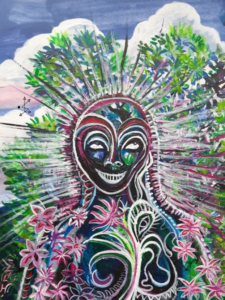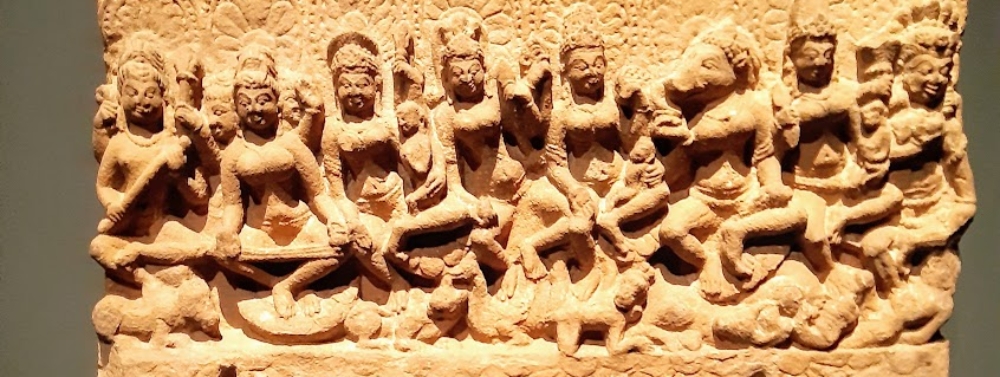This chapter is written by my dear friend Miryamdevi, high priestess of the Jitterbug Cult.
Tom Robbins,
our prophet
***
The highest function of Love is that it makes the loved one a unique and irreplaceable being.
Tom Robbins, Jitterbug Perfume
Imbolc is celebrated on February 1st, which is about halfway between the winter solstice and the spring equinox. At this time of the year, flowers are starting to come back and little buds start to form on the trees. This is the first sign of Mother Nature slowly waking up after the long winter sleep and reminds us that we are also reawakening, letting go of the past and making space for new beginnings and new plans.
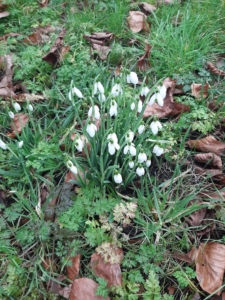
Snowdrops
Most of the snowdrop species flower in winter. In the language of flowers, the snowdrop is synonymous with ‘hope’, as it is seen as ‘heralding’ the new spring and new year.
Green is the colour of nature and it resonates with growth and expansion, stability and endurance. Green also symbolises harmony, healing, fertility, hope, love and protection. These qualities make us broaden our hearts and fill them with the love and excitement of a budding new dream.
On February first, just before dawn, if you listen very carefully, you just might hear the hypnotic melodies of the magical panpipes of the ancient god, and if you are lucky you might just see him skipping along the shadows doing his crazy Jitterbug dance.
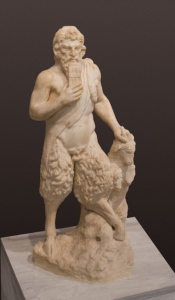
Pan Archmus Herkalion
Herodotus wrote that according to Egyptian chronology, Pan was the most ancient of the gods
A couple of weeks after Imbolc, on February 14th, we are celebrating St. Beetaroota day. On this day we immortalise the love story between the field maiden Beetaroota and Pan. We also learn how the humble winter root is a key ingredient in two of the most important magical formulas of all time.
Jitterybug Perfume oil (K23)
Grape seed oil & beetroot extract
Horny Goat weed extract
Leather fragrance
White Musk fragrance
Oud fragrance
Amber fragrance
***
Vetiver
Palma Rosa
Jasmine Sambac
Jasmine Officinale
Bergamot
Lemongrass
The above 4 fragrances are representative of the scentual aroma of the body of Pan:
- Leather for flesh and blood.
- White Musk for its earthy, animalistic, sensual qualities like the animal pheromone secretion.
- Oud also known as agarwood, is extracted from the fungus-infected resinous heartwood of the agar tree, which is primarily found in the dense forests of Southeast Asia, India and Bangladesh. It is either extracted by distillation from the wood or by melting the resin. The unique fragrance of Oud is rare and precious, just like the characteristics and charisma of Pan.
- Amber is a ‘fantasy’ perfumery note. It consists of a few ingredients (natural and synthetic) such as vanilla, patchouli, labdanum, styrax, benzoin and a few more, to create a warm, powdery, sweet scent. The God Pan is the wildest fantasy of mother nature.
The second stage of making the Jitterybug perfume oil was to recreate a scent that will represent the sweet earthy – tangy aroma of the beetroot.
The beetroot is the taproot portion of a beet plant. It is one of several cultivated varieties of Beta vulgaris grown for their edible taproots and leaves (called beet greens). Beetroots are a great source of many essential vitamins and minerals. It’s packed with essential nutrients and is a great source of fibre, folate (vitamin B9), manganese, potassium, iron, and vitamin C and also it contains high concentrations of the element Boron, which is believed to play a key role in producing human sex hormones.
Beetroots have long been considered an aphrodisiac in many cultures.
Aphrodite, the Greek Goddess of Love, Pleasure and Fertility, was irresistible among the Goddesses and desired by all. Legend tells us that eating beets was the secret to her ageless beauty. The Oracle at Delphi decreed beets to be worth their weight in silver because of their deep mystic potency. (Wikipedia)
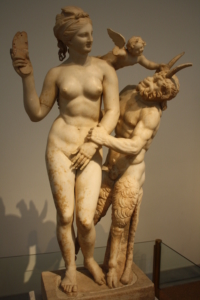
Aphrodite, Eros & Pan (National Archaeological Museum, Athens/Wikipedia commons) In the picture above both God and Goddess seem stimulated after (probably) indulging in just a little too many beets, Poor little Eros above them, not sure if to separate the two or join in…
As I mentioned above, beetroot contains high concentrations of the element Boron, which is thought to have a major role in adjusting the body’s natural production of testosterone, and estradiol – a type of estrogen.
Both Aphrodite and Pan were well aware of the benefits of the beetroots.
Unfortunately, beetroot doesn’t produce any essential oils, so I used a little beet extract as a symbolic gesture. To recreate the scent of the beetroot I used the essential oil of Vetiver and palmarosa.
Vetiver essential oil has a deep smoky, sweet earthy-woody aroma like the earth which resonates with the deep earthy scent of beetroot, connecting us to our deeper roots, to the pulsating heart of nature. (For more details about vetiver see the chapter Black Magick).
Invocations to the green power should begin with self-love; an attempt to see the wonderful side of every self one consists of, and then proceed into a ritual affirmation of the beauty and loveability of all things and all people. Suitable god forms for the Love-self include Venus, Aphrodite and the mythical Narcissus…
Peter Carroll/Green Magic/Liber Kaos
With all respect to the mythical Narcissus, this chapter is dealing with the ancient god of Nature and earth, a god that some might say is long dead. But for us, of the Jitterybug cult, he is very much alive and kicking. He is the god of the Green Magick season.
Io Pan
Invocations to the green power should begin with self-love
When we think of self-love, we must take into consideration the differences between Pan and Narcissus.
The path of self-love is a narrow one and could lead to destruction through self-delusion, obsession and isolation. This was pretty much Narcissus’s way. On the other hand, we have the wild, beasty, earthy way of Pan which can teach us self-love through the appreciation of nature, music and dance. Through pleasures of body, ecstasy and trance, we can learn to see the hidden beauty in every living being and situation. Pan teaches us to have the courage to be wild and leads us to liberation.
Palmarosa Cymbopogon martinii

Cymbopogon martinii
Palmarosa is a wild herbaceous plant with long grasslike fragrant stems. It is native to India and Pakistan but also grown in Africa, Indonesia, Brazil and the Comoro Islands. Palmarosa essential oil is pale yellow or olive liquid with a sweet, balsamic, somewhat citrusy, geranium-like scent.
While vetiver is related to the earth element which resonates strongly with Pan and his affinity with the land and nature, Palmarosa is related to the water element which resonates with the flowing nature of love and healing. Both vetiver and palmarosa are under the planetary rule of Venus, which might explain the strange and wild attraction between Pan and Aphrodite in the picture above (Aphrodite, Eros & Pan). The flowing nature of palmarosa oil soothes the mind and can help heal broken hearts and overcome negative emotions and move forward with our lives.
Pan is dead?
In the story, De Defectu Oraculorum Plutarch wrote:
“[the] ship drove with the tide till it was carried near the Isles of Paxi; when immediately a voice was heard … calling unto one Thamus, and that with so loud a voice as made all the company amazed; … the voice said aloud to him, ‘When you arrive at Palodes, take care to make it known that the great god Pan is dead.’ … this voice did much to astonish all that heard it, and caused much arguing whether this voice was to be obeyed or slighted…”
The announcement of Pan’s death was spread throughout the Roman Empire during the reign of Emperor Tiberius. As the ancient empires began to grow, the wild suffered, as did Pan’s life essence.
Pan was the God of the Wild and his essence filled his surroundings with life and vitality. Nature was at its most bountiful when Pan was present.
Pan’s death and his symbiotic relationship with nature represent the crisis over the loss of nature and pagan worship and the shift to Christian monotheism. The growth and spread of the Roman Empire led to many new roads laid through woodlands, fields and forests. New settlements started to flourish and spread along those new and modern roads, destroying the natural habitats of flora and fauna.
Pan’s name could also mean “all”, which leads to the assumption that his death had been that of all the demons of the pre-Christian era. The goat-legged god became the image of the devil and Pan’s image was vastly used in Christian literature and art as the image of Satan.
However, besides Plutarch’s work, there was no indication that Pan had ever died. In fact, a century after Plutarch’s time, Pausanias described shrines, grottos and sacred caves devoted to Pan that were still very much in use for rituals and pilgrimage.
In the second aeon, Men knew me as the Horned God, Pangenitor Panphage
Verse 0 Book 1: Sacred scriptures of the Jitterybug cult
Pan is not Dead. He is Just resting
Verse 1 Book 1: Sacred scriptures of the Jitterybug cult
The only way Pan could shake off the satanic image the New Christians attributed to him was to go underground. But Pan, being the God of nature and a fertile symbol of the land, knew he would be found and hunted till the edge of the world. The new lords of the land will track him down and sniff his beasty pheromones out. The only place they will not be able to track his scent will be if he hides (or make them think he is hiding) in the depth of the sea.
The rumour about Pan’s death started onboard a ship cruising the Ionian Sea when Thamus, an Egyptian sailor, sailed to Italy. As he passed by the Greek islands, he heard a divine voice call to him from across the water saying – “The great god Pan is dead!”
Plutarch ‘forgot’ to mention, that Thamus was a devotee of Pan (some say he was one of Pan’s most celebrated high priests) who started the rumour as part of Pan’s manifesto to keep the balance and harmony of the land by letting the wild things be wild at heart and nature.
The sacred scriptures of the Jitterybug cult tell us how Kudra created a special scent, a perfume to mask the scent of Pan, so he can walk free among us without being detected or recognised, the K23.
Kudra had to apply all her perfumery skills, aromatic knowledge and scentual abilities to cover the scent of Pan. As you know, Pan is the god of the wild, shepherds and flocks. He has the hindquarters, legs, and horns of a goat. For those of you that have never experienced the farmyard smells of a goat pen, there are not many ways to describe the distinct smell of goats, especially male goats — They stink.
Creating a perfume that will be suitable for a god is a serious task, even more so if the perfume in mind needs to conceal the scent of one of the stinkier gods around.
Kudra was somewhat vague about the ingredients she used to create the k23. We know she collected the very rare pollen of the beetroot to balance out with earthy tones and the animalistic stench of the goat, and then she added the best quality Jasmine oil she could find. In Kudra’s case, it will probably be ok to assume she used Jasmine Sambac.
Jasmine has the honour of being one of the highest-priced plant scents and has often been called the king of flowers. (Scott Cunningham:1997).
Earlier in the book, Jasmine was also dedicated to the Amrita Kala (Amrita means “immortality”) and resonates with the sexual magic elixir. She is also associated with Lalita. Lalita is a Hindu goddess, worshipped as a principal aspect of the supreme goddess Mahadevi. The intense scent of Jasmine can affect our emotions by producing feelings of optimism, confidence and euphoria in the hearts of the devotees at the time of worshipping the gods.
The powerful aroma of Jasmine will be sufficient enough to tone down the stench of the goat, and at the same time will support its life essence and vitality, sexual appeal and stamina, which are so vital for the man-goat-God Pan.
The last of the ingredients of the perfume according to Kudra should be a light and airy note of the citrus family. Without much thinking, I reached for the bottle of Bergamot and added a few drops to the perfume oil blend. After all, what is better than the fresh fruity sweet aroma of Bergamot to lift the spirit and keep the vital essence of life, flowing freely and smoothly throughout the body and mind. However, after letting the blend settle, I noticed that one high keynote is still missing to make the perfume whole.
So what would it be?
It was very difficult to decide between the fresh, grassy-lemony scent of the Lemongrass with the equally fresh, lemony, fruity-floral fragrance of Lemon-Verbena, so after a few trials, I decided to ‘keep it in the family and chose Palmarosa older cousin – Lemongrass. As already described in Octarine Magick’s chapter, the intensity of the fresh lemon-herby scent of the lemongrass can bring up fragments of deep and long-lost memories of ancient wildlands and open spaces.
This version of the K23 is a very complex and paradoxical blend of scents, aromas and fragrances. The journey to create a perfume that at the same time will represent the essence of the God Pan, and conceal it within its unique scent, took me on a journey exploring the rhythms and vibes of Green Magick which I never expected when I started writing this chapter. I am grateful for the author who recognised my skills and knowledge of the sacred teachings of the cult of the last God who can still dance the Jitterbug.
Before I go, I entrust you with the cult’s most sacred scripture — the teaching of St Beetaroota and the secret of the beets.
February 20k23
Miryamdevi, Jitterbug priestess
